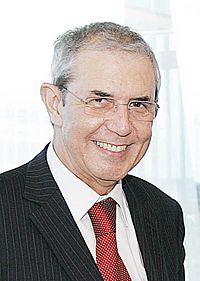Emilio Pérez Touriño facts for kids
Quick facts for kids
Emilio Pérez Touriño
|
|
|---|---|
 |
|
| President of the Regional Government of Galicia | |
| In office 2 August 2005 – 17 April 2009 |
|
| Vice President | Anxo Quintana |
| Preceded by | Manuel Fraga |
| Succeeded by | Alberto Núñez Feijóo |
| Secretary-General of the Socialists' Party of Galicia | |
| In office 10 October 1998 – 2 March 2009 |
|
| Preceded by | Francisco Vázquez Vázquez |
| Succeeded by | Pachi Vázquez |
| Member of the Parliament of Galicia | |
| In office 20 November 2001 – 10 March 2010 |
|
| Constituency | Pontevedra |
| In office 16 October 1997 – 20 November 2001 |
|
| Constituency | A Coruña |
| Member of the Congress of Deputies | |
| In office 3 March 1996 – 28 October 1997 |
|
| Constituency | Pontevedra |
| Personal details | |
| Born |
Emilio Pérez Touriño
8 August 1948 A Coruña, Galicia, Spain |
| Political party | PSdeG–PSOE |
| Spouse | Esther Cid |
| Alma mater | University of Santiago de Compostela |
| Profession | Professor |
Emilio Pérez Touriño, born on August 8, 1948, is a Spanish politician and an expert in economics. He used to be the leader of the Socialists' Party of Galicia. From August 2005 to March 2009, he served as the president of Galicia, which is a special region in Spain. In this role, he led the government of Galicia, known as the Xunta de Galicia. His political ideas are based on social democracy and supporting the unique culture of Galicia.
Contents
Emilio Pérez Touriño's Education and Career
Emilio Pérez Touriño is an economist by profession. He studied at the University of Grenoble in France. He also earned his advanced degree in economics from the University of Santiago de Compostela in Spain. At this university, he was also the vice-president in charge of money matters.
During his time at the university, Touriño was very active in teaching and writing. He published many works about economics and how regions develop. He often used Galicia and its transportation systems as examples. He studied how Galicia could better connect with the European Union.
Emilio Pérez Touriño's Political Journey
During Spain's move to democracy (from 1975 to 1982), after the time of Francoist Spain, Touriño became a political activist who supported left-wing ideas. He even helped write the rules for how Galicia would govern itself, called the Galician Statute of Autonomy of 1981.
He later joined the team of minister Abel Caballero in the Spanish government, working in transportation, tourism, and communications. He also held an important job in the ministry for public works and the environment. In 1994, he faced some challenges and decided to step away from politics for a short time. That same year, he received a special award called the Spanish Great Cross of Civil Merit.
Touriño returned to politics in 1996. He was elected to the Spanish Congress to represent the A Coruña Province. However, he left Congress in 1997.
Leading the Socialists' Party of Galicia
In 1998, Touriño took over from Francisco Vázquez as the main leader of the Socialists' Party of Galicia. This was a big step in his political career.
Becoming President of Galicia
In 2005, Emilio Pérez Touriño became the president of Galicia. His party won against Manuel Fraga's People's Party of Galicia. This was possible because his party formed a team with another party, the Galician Nationalist Bloc. Together, they created a coalition government.
After this, the Spanish Prime Minister, José Luis Rodríguez Zapatero, worked with both parties. They looked at the current rules for Galicia's self-government to make sure Galicia's place within Spain was clear. Touriño was re-elected as the leader of the Socialists' Party of Galicia in July 2008.
In the elections of 2009, his government was replaced by Alberto Núñez Feijóo from the PP party.
See also
 In Spanish: Emilio Pérez Touriño para niños
In Spanish: Emilio Pérez Touriño para niños
- Xunta de Galicia
- Parliament of Galicia
- Galician Statute of Autonomy of 1981
- Socialists' Party of Galicia
- Spanish Socialist Workers' Party
 | Georgia Louise Harris Brown |
 | Julian Abele |
 | Norma Merrick Sklarek |
 | William Sidney Pittman |

